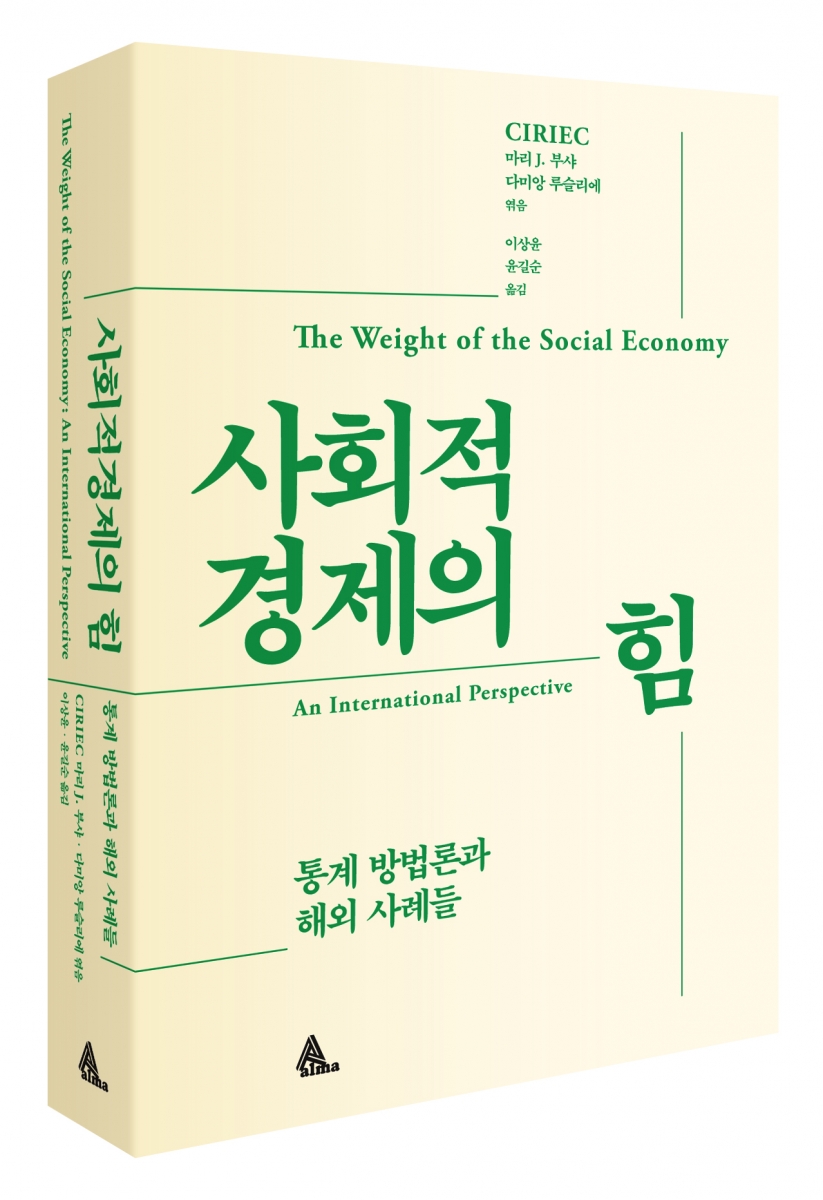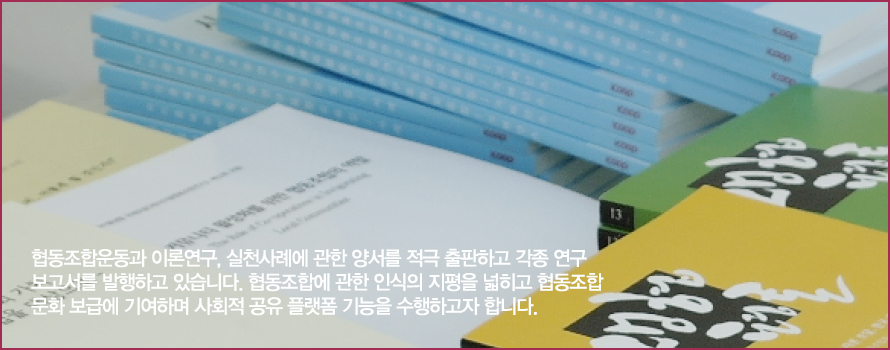 |
Editor: CIRIEC, Marie J. Bouchard, Damien Rousselière
Translator: Gil-Soon Yoon, Sang-Youn Lee
Publisher: iCOOP Co-operative Institute (foundation)
Chairperson Yu-jin Yoon
Publication date: 21 May 20199
Edition: New edition(150*220)
Pages: 502
Price: 25,000 won
ISBN: 978-89-98642-45-7 Book Introduction “What is the weight of the social economy? How should we measure it?”
Throughout the world, cooperatives, non-pro¬ t and mutual bene¬ t organizations, foundations and other social enterprises play an important role in job creation, social cohesion, social innovation, regional development and environmental protection. Observations tend to con¬firm the ability of the social economy to contribute to balancing economies, mainly by serving as an anti-cyclical force in the face of economic crises. However, many countries and regions lack statistical information about its weight, size and scope on their territory.
This book fills a gap in the literature about the social economy. It seeks to explain why it is important to have statistics on it, to understand how they are produced, and to project how the social economy might be better understood in the future. The book offers researchers and decision-makers an overview of the current state of knowledge on these topics. As any social phenomenon, the social economy is a social construct. Its quantification and measurement will result in the harding of its definition and a decrease of any ambiguity about it, which in turn contributes to its legitimization. Yet, this same process will also reduce and flatten its complexity and richness, again prompting reflection about the appropriateness of definitions and methodologies.
This book is composed of two parts. The first part examines methodological concerns and theoretical issues that need to be addressed and clarified in order to produce sound statistics about the social economy. The chapters look into indicators, qualification criteria of entities, classification system and the international standardization of methodologies. The scond part of the book explores what can be learned from specific studies. The chapers examine particular methodologies(satellite account, impact assessment, national surveys) and issues(research collaboration, informal and hybrid organizations) in different national settings. These cases, which not exhaustive, offer a good overview of some of the most important methods that are used and the questions that ensue when producing statistics on the social economy. About the Editors CIRIEC(International Centre of Research and Information on the Public, Social and Cooperative Economy)
CIRIEC is a non-govermental international scientific organization. Its objectives are to undertake and promote the collection of information, scientific research, and the publication of works on economic sectors and activities oriented towards the service of the general and collective interest Marie J. Bouchard
Marie J. Bouchard is full Professor at Université du Québec à Montréal (Canada), Director of the Collective Enterprise Axis at Centre de recherchésur les innovations sociales (CRISES). She holds a doctorate in sociology from the École des Hautes Études en Sciences Sociales, France. She is a regular member of the Centre de recherche sur les innovations sociales(CRISES), where she currently leads a research areaon social innovations and collective enterprises. She was co-head of the Community Housing Research Partnership of the Community-University Resaerch Alliance on the Social Economy(CURA-SE)(2000-2010). She held the Canade Research Chair on the Social Economy(2003-2013), where she dedicated her work to the conceptual and stastical marking of the social economy, social innovation and evaluation. In 2015, she was appointed president of the CIRIEC International Scientific Commission of the “Social and Cooperative Economy”. In recent years, she published Se loger autrement au Québec(Éditions St-Martin, 2008), The Worth of the Social Economy(Peter Lang, 2009) and L’économie sociale au Québec, vecteur d’innovation(Presses de l’Université du Québec, 2011). An English version of the latter book was also published under title Innovations in the Social Economy, The Québec Experience by Universty of Tronto Press(2013). Damien Rousselière Damien Rousselière is full Professor of economics at AGROCAMPUS OUEST (Public University of Agricultural Sciences in Angers and Rennes) and visiting professor at Université du Québec à Montréal(since 2010). Previously assistant professor at Université de Grenoble and was a postdoctoral fellow at the Canada Research Chair on the Social Economy(2007), where he contributed to the stastical survey on the social economy in Montreal. An external consultant for the Environment Directorate of the OECD, he is a specialist of quantative methods applied to the social economy and in particular to agricultural cooperative. He has published among others in Canadaian Review of Sociology, International Review of Sociology and Journal of Economic Behavior and Organization. He serves on the scientific council of Coop de France (French federation of agricultural cooperatives) and Végépolys(a French cluster on horticulture, seeds and urban landscaping) and is a member of the CIRIEC International Scientific Commission on the “Social and Cooperative Economy”. Translator Sang—Youn Lee Dr. Sang-Youn Lee currently works as an assistant professor in the Graduate School of Social and Solidarity Economy at Sungkonghoe University(SKHU) in South Korea. He holds a PhD in management (major: entrepreneurship) from Washington State University. Dr. Lee does research in social collective enterprises with sociological and management theories. His academic goal is to be an engaged scholar sharing intellectual knowledge. Before joining SKHU, he worked as an assistant professor at the State University of New York New Paltz School of Business. His research has published among others in Long Range Planning and Journal of International Entrepreneurship leading management journals. In the real business area, he worked at the telecom industry for 10years and was in charge of corporate venturing. He currently serves as a member of the expert committee of the social economy in the Presidential Committee on Job Creation and was a member of the planning committee on the “Korea Social Value and Solidarity Foundation”. Gil-Soon Yoon
Gil-Soon Yoon is a researcher of the Institute of Co-operative Management at Sungkonghoe University (SKHU) and a member of the Coopy Co-operative, a knowledge producer co-operative for the research and consulting for the social economy and its enterprises. She holds a master’s degree in business administration from SKHU and is working on her doctoral dissertation after completing PhD coursework for co-operative management at SKHU. Her research activities focus on the relationship between the democratic governance and performance of co-operatives, the methodologies for grasping social economy’s weight, size and scope, and the quality management of social services in co-operative enterprises. She works as a translator as well and has translated more than 60 copies written in English including The Weight of the Social Economy: An International Perspective and The Village against the World about the story of Marinaleda, a co-operative village in Spain. Publisher iCOOP Cooperative Institute (foundation) iCOOP Cooperative Institute is established as a voluntary association with name of “Korea Consumer Cooperative Research Institute” in May 2006. It re-established as a foundation in March 2010. It is funded by 270 thousand iCOOP KOREA members’ donation. Its mission is to become the think-tank of iCOOP KOREA and the platform of Korean cooperative movement. It conducts variety of surveys, researches, archives, and education to contribute knowledge-based management of Korean cooperatives and to enhance knowledge sharing for sound culture of Korean cooperative movement. Contents [Preface] Hyung-mi Kim (iCOOP Co-operative Institute, Director in Chief)
[The words of Recommendation] Jea-Gu Kim (Myongji University Professor, Former Korea Social Enterprise Promotion Agency Director)
[Editors’ words to Korean version] Marie J. Bouchard / Damien Rousselière
[Acknowledgement] Marie J. Bouchard / Damien Rousselière Introduction.The Weight, Size and Scope of the Social Economy 18 Part I. Methodological Concerns in Producing Statistics on the Social Economy
The Pioneer Work of CIRIEC-España 47
- José Luis Monzón
Does the Social Economy Count? How Should We Measure It? Representations of the Social Economy through Statistical Indicators 58
- AmélieArtis, Marie J. Bouchard & Damien Rousselière
Mapping the Field of the Social Economy. Identifying Social Economy Entities 103
- Marie J. Bouchard,Paulo Cruz Filho, Martin St-Denis
Organizing the Field of the Social Economy. The Social Economy and Its Classification Within Systems of National Accounts 135
- ÉdithArchambault
International ComparisonsLessons from the Measurement of the Nonprofit Component 173
- Lester M. Salamon, S. WojciechSokolowski& Megan A. Haddock
So, What Does a Social Economy Enterprise “Produce”? 211
- Sybille Mertens, Michel Marée Part II. What Can Be Learned From Specific Studies
The Construction of Social and Solidarity Economy Statistics in France. A Progressive Mobilization of Very Diverse Actors 239
- DanièleDemoustier, ÉlisaBraley, Thomas Guérin, Daniel Rault
The Production of Statistics for the Social Economy in Belgium. A Focus on Mutuals and Cooperatives 256
- FabienneFecher&Wafa Ben Sedrine Lejeune
Collaborative Research Between Civil Society, State and the Academia. Lessons from the Brazilian Mapping of the Solidarity Economy 308
- Luiz InácioGaiger
To Estimate the Scope and Size of the Social Economy in Japan. Challenges for Producing Comprehensive Statistics 347
- Akira Kurimoto
Challenges in Conducting a Study on the Economic Impact of Co-operatives 377
- NicoletaUzea& Fiona Duguid
Mapping Social Enterprise in the UK. Definitions, Typologies and Hybrids 416
- Roger Spear Conclusion. A Research Agenda for Statistics on the Social Economy 461
- Marie J. Bouchard & Damien Rousselière About the author 494
The words of the translator 503
- Sang—Youn Lee, Gil-Soon Yoon |


